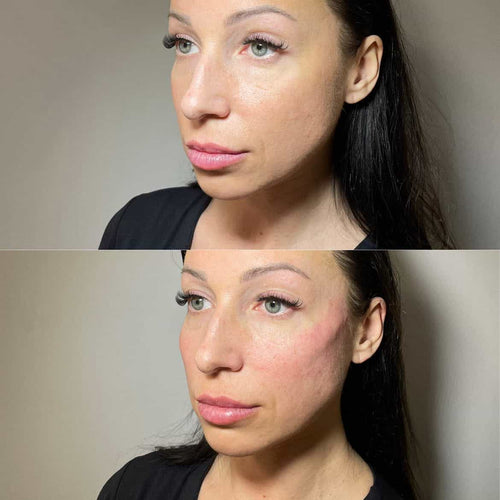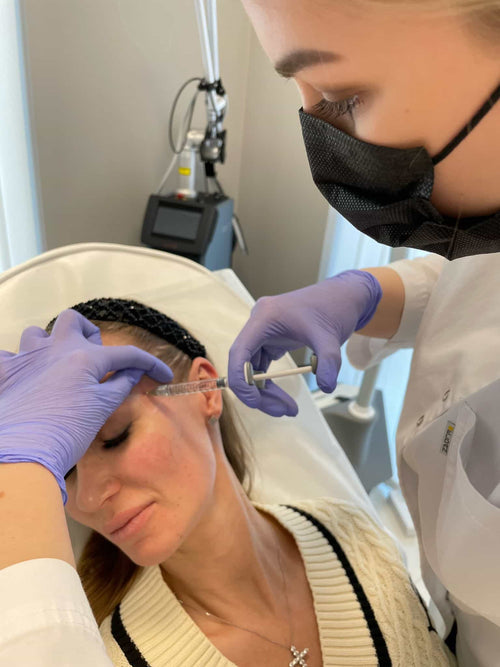Arrange a Dermal Filler Consultation with Dr. Laura Geige Now
Factors Affecting Lip Filler Longevity
Lip Volume Desired

Several factors influence how long lip filler results last. One major factor is the type of filler used. Hyaluronic acid fillers, which are the most common type, typically last between 6 to 18 months.
The amount of filler injected also plays a role. Larger injections tend to last longer than smaller ones because there’s more material for your body to gradually break down.

Your metabolism and how quickly your body processes hyaluronic acid can affect longevity. People with faster metabolisms may see their results fade sooner.
Lip movement and muscle activity contribute to filler breakdown. Individuals who frequently pucker, smile, or talk may experience faster fading due to the increased stress on the filler.
Sun exposure can also degrade hyaluronic acid fillers, leading to a shorter lifespan. Protecting your lips with sunscreen is essential for maximizing longevity.
Lip volume desired is directly related to the amount of filler injected. If you desire a subtle enhancement, less filler will be needed, potentially leading to quicker resorption and a shorter duration. For more dramatic results, a larger volume is typically required, which can result in longer-lasting effects.
Following your injector’s post-treatment instructions carefully is crucial for optimizing filler longevity. This includes avoiding touching or massaging the injection sites, refraining from strenuous exercise for a few days, and staying hydrated.
Lifestyle Choices
Many factors can influence how long lip fillers last. On average, initial lip filler results typically last between 6 to 18 months.
However, individual experiences can vary significantly due to a combination of biological and lifestyle factors.
-
**Dermal Filler Type:** Different types of dermal fillers are formulated with varying compositions and degrade at different rates. Hyaluronic acid (HA) fillers tend to be more temporary, while poly-L lactic acid (PLLA) fillers can last longer.
-
Metabolic Rate: People with faster metabolic rates may metabolize fillers more quickly, resulting in shorter longevity.
-
Sun Exposure:** Excessive sun exposure can break down the filler particles and cause them to fade faster.
-
Skin Thickness: Individuals with thinner skin may experience faster filler absorption.
-
**Smoking:** Smoking constricts blood vessels, which can hinder nutrient supply to the treated area and affect filler longevity.
-
Alcohol Consumption: Excessive alcohol intake can dehydrate the skin and potentially reduce filler effectiveness.
-
**Facial Expressions:** People who frequently make expressive facial movements may experience faster breakdown of fillers in areas prone to movement, such as around the lips.
Maintaining a healthy lifestyle can help maximize lip filler longevity. Protect your lips from the sun by wearing a lip balm with SPF and avoid excessive smoking and alcohol consumption.
Regular hydration and a balanced diet also contribute to overall skin health, which can indirectly impact filler longevity.
Individual Metabolism
Several factors influence how long lip fillers last. One key factor is the type of filler used.
Hyaluronic acid (HA) fillers, like Juvederm and Restylane, are generally considered temporary, lasting anywhere from 6 months to 2 years, depending on individual variations and the specific product.
Long-lasting fillers, such as Bellafill or Radiesse, can remain effective for up to 5 years but are more expensive.
Individual metabolism plays a significant role in filler longevity. People who metabolize HA faster may see results fade sooner compared to those with slower metabolisms.
Other factors affecting longevity include:
• Age: Younger skin typically has better collagen production, helping fillers last longer.
• Lip Movement and Expression: People who frequently use their lips for smiling, talking, or smoking may experience faster breakdown of filler.
• Sun Exposure: UV radiation can degrade hyaluronic acid, potentially shortening its lifespan.
• Injection Technique: A skilled injector can strategically place filler to optimize longevity and minimize migration.
• Lifestyle Factors: Smoking, alcohol consumption, and dehydration can all impact skin health and filler longevity.
Average Lifespan of Lip Fillers
Typical Duration
Lip fillers typically last anywhere from 6 to 18 months on average.
The exact duration depends on a variety of factors, including the type of filler used, the individual’s metabolism, and lifestyle habits.
Hyaluronic acid fillers, which are the most common type used for lip augmentation, tend to break down more slowly than other types of fillers. This means they can last longer.
Factors like sun exposure, smoking, and excessive facial movements can all contribute to faster filler degradation.
Some people may see their fillers lasting closer to 6 months, while others may experience results that stretch for up to a year or even longer.
Regular follow-up appointments with a qualified injector are recommended to maintain the desired fullness and ensure optimal results.
During these appointments, additional filler can be injected to replenish lost volume as needed.
Variations Between Products
Arrange Your Dermal Filler Consultation with Dr. Laura Geige
The average lifespan of lip fillers varies depending on several factors, primarily the type of filler used and individual patient characteristics. However, most hyaluronic acid-based fillers typically last between 6 to 18 months.
Hyaluronic acid (HA) fillers are the most common type of lip filler due to their safety and natural-looking results. They attract and hold water, plumping the lips and smoothing fine lines. The duration of HA fillers depends on the specific product, with some brands designed for longer-lasting effects than others.
Other factors influencing longevity include the amount of filler injected, the individual’s metabolism, skin thickness, and lifestyle habits like smoking or excessive sun exposure. Smoking can break down collagen and elastin, leading to faster filler degradation, while sun damage can cause premature aging and affect filler results.
Some newer fillers on the market claim to last longer than traditional HA fillers, potentially up to two years. These often utilize innovative technologies or cross-linking processes that increase their stability within the body.
It’s important to consult with a qualified and experienced injector who can assess your individual needs and recommend the most suitable filler type and treatment plan for optimal results and longevity.
Maintaining Your Lip Filler Results
Touch-Up Appointments
Lip fillers typically last anywhere from 6 to 18 months depending on several factors, including the type of filler used, individual metabolism, and lifestyle habits.
To maximize your lip filler results and extend their longevity, follow these tips:
**Hydrate:** Drinking plenty of water keeps lips hydrated from within, helping to plump them and prevent dryness that can make fillers appear less noticeable.
**Sun Protection:** UV rays can degrade hyaluronic acid fillers, so always apply a broad-spectrum sunscreen with an SPF of 30 or higher to your lips.
**Avoid Smoking and Excessive Alcohol Consumption:** These habits can dehydrate the skin and lead to faster filler breakdown.
**Gentle Lip Care:** Avoid harsh exfoliation or scrubs on your lips, as this can damage the delicate skin and affect filler distribution.
**Facial Massage:** Gently massaging your lips daily can help promote blood flow and circulation, potentially prolonging the effects of fillers.
**Touch-Up Appointments:** Most people will require touch-up appointments to maintain their desired lip shape and volume as fillers gradually dissolve.
Schedule these follow-up appointments with your injector based on individual needs and filler type. They can assess your results and determine the best schedule for optimal maintenance.
Protecting Your Investment
Lip filler results can typically last anywhere from 6 to 18 months, depending on several factors such as the type of filler used, your individual metabolism, and how well you care for your lips.
To maximize the longevity of your lip filler investment, consider these essential tips:
-
Avoid excessive sun exposure: Ultraviolet (UV) radiation can break down hyaluronic acid fillers, leading to premature fading and degradation. Always wear broad-spectrum sunscreen with an SPF of 30 or higher on your lips, even on cloudy days.
-
Stay hydrated: Drinking plenty of water helps keep the skin hydrated and plump, which can contribute to maintaining lip filler volume.
-
Avoid smoking and excessive alcohol consumption: These habits can dehydrate the skin and negatively impact collagen production, potentially affecting the longevity of your lip filler results.
-
Be gentle with your lips: Avoid picking, biting, or excessively licking your lips. This can cause irritation and breakdown of the filler material.
-
Use a hydrating lip balm regularly: Choose a balm with nourishing ingredients like hyaluronic acid, ceramides, or shea butter to keep your lips moisturized and protected.
-
Consider touch-up appointments: Most patients require touch-up injections every 6-12 months to maintain their desired lip volume and shape.
Book a Dermal Filler Consultation at It’s Me and You Clinic with Dr. Laura Geige
By following these simple tips, you can help prolong the effects of your lip filler and enjoy fuller, more youthful-looking lips for an extended period.
Super Sleep Yoga Madison Art Therapy Line the Studio Your Relationship Edge
- Why Can’t I Vape After Lip Filler - November 13, 2025
- What Is The Best Age To Get Cheek Fillers? - November 12, 2025
- What Are CBD Gummies And How Do They Help With Pain Relief - November 10, 2025
